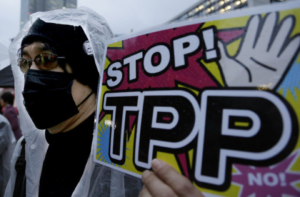Convention Preview: Left vs. Far Left on Energy
This is the first in a series of insights we’ll be providing on different policy platform fights in the weeks leading up to the Republican and Democratic National Conventions.
Here’s What You Need to Know
While several left-wing environmental organizations are now coalescing around Hillary Clinton, many in the environmental movement are still unsatisfied. Liberal donors to these organizations have threatened to pull funding if they endorsed Clinton, hurting their ability to provide grassroots support to the presumptive Democratic nominee. These concerns are partly why the Democratic establishment struck a deal with the Sanders campaign that gave them five of the 15 slots on the convention’s platform committee for them to air out their policy views.
Yet, by making this concession to Sanders, the DNC has lit the fire of a messy debate. One of Sanders’ picks for the platform committee attacked Clinton earlier this year for being “slow, halting and grudging” in her efforts on climate change. And last weekend in Phoenix, the DNC held hearings that turned into a left vs. far-left dispute on energy policy.
Subscribe to Receive Insights
"*" indicates required fields
The fault line being drawn focus on these three energy issues that are likely to come up on at the Democrats’ convention next month:
- Fracking: Earlier this month, several environmental groups petitioned the DNC to ban fracking in the party’s platform. Sanders has attacked Clinton for not supporting such a ban as recently as two weeks ago. But Clinton’s supporters have told “the ban’s proponents [they] are being unrealistic.” If environmental activists don’t get a fracking ban in the platform, whether or not they sit on the sidelines for the rest of the election should be closely watched.
- Pipelines: A recently released report from an electric reliability watchdog notes President Obama’s “Clean Power Plan” will spur the need for additional pipeline infrastructure to deliver natural gas and reduce emissions. But some environmental activists are joining the Rockefeller Family Fund, who convened a meeting this week to “craft a strategy to fight the use of eminent domain for pipelines and other fossil-fuel infrastructure.” Watch for activists to demand a ban on any future pipeline construction.
- How To Meet Paris Goals: A former Sierra Club lawyer said last week that Clinton’s choices on how to meet emissions reduction goals from the Paris climate agreement are limited to what’s available in the Clean Air Act. But some may want Clinton to go even further by promoting a cap-and-trade program that went down in flames six years ago under a Democratically-controlled Congress. Clinton has avoided mentioning cap-and-trade for good reason, but environmental activists on the platform committee may force her to take a position.
Clinton has tried to play small ball on energy issues so far with a focus on solar panels and conservation, while attempting to walk back her statements suggesting the coal industry should be put out of business. But energy issues have increasingly become ‘up or down’ items for a large segment of the Democratic base Hillary needs to unify in order to win in November. What happens at platform committee will be the first indication of how far left Clinton is willing to go without sacrificing voters in the middle.
News You Can Use
Voting is already underway in the UK referendum on EU membership. Check out our “Here’s What You Need To Know” from earlier this month on some of the unexpected factors that could drive turnout and voting preferences.”
REPUBLICAN RED TAPE REMOVAL PLAN
Can Congressional gridlock be good for business? If House Speaker Paul Ryan gets his way, it can. The Congressional Republicans’ economic policy agenda released last week includes a plan to require Congressional approval of any federal regulations that would have a significant impact on businesses. As Speaker Ryan explained, “No major regulation should become law unless Congress takes a vote.” Throughout the Obama administration, Republicans have been searching for a better way to block regulations that have hurt the economy and they may now have finally found their solution in the form of Congressional logjam.
RETWEETS = GROUPTHINK
A new Columbia University study found that 59 percent of links shared on social media outlets were not clicked before being shared. The study discovered that these peer-to-peer shares play an important role in determining what news gets circulated online and what news get brushed aside. As more and more people get their news almost exclusively online, these trends mean thoughtless retweets driven by confirmation bias are actually shaping our political and cultural discussion.
BOARD MEMBER NOT FOUND
Lululemon Athletica has had recent financial troubles, and founder Chip Wilson is quick to blame the company’s longest serving board members. And yet, on closer inspection, the single longest serving board director, Rhoda Pitcher, appears to have no traceable personal history, no identifiable photo, a business that could not be found, and a degree from an unaccredited entity with a residential street address. The discovery has prompted uncomfortable questions for the company’s management, board and auditor: who is ensuring proper due diligence is done on board members? We happen to know a good firm for that.
PRESIDENTIAL EMAIL PROJECT
Michael Winters of EdSurge.com recently published a Medium post after reading 3,000 campaign and fundraising emails from various 2016 presidential candidates. His effort determined “there is precious little to be learned from emails from our presidential candidates.” Winters formed key conclusions that candidates email A LOT, it’s almost always to ask for money and never to discuss issues, the emails are only unintentionally entertaining, and every other 2016 candidate hates Hillary Clinton. Not surprisingly, the project confirmed that campaigns merely use email for fundraising from loyal supporters by scaring them with visions of a world where their political rivals win the election.
OBAMA’S RULES OF ENGAGEMENT
President Obama’s desire to deliver on his campaign promise of ending the American combat mission in Afghanistan is beginning to complicate achieving some of the ongoing U.S. foreign policy goals in the region. With the end of the official combat mission, the U.S. is no longer technically at war with the Taliban, requiring the remaining Special Forces troops in the country to consider the legality each time they fire on Taliban fighters. By forcing into reality his goal of declaring mission accomplished in Afghanistan, President Obama has actually created a situation that makes it even more difficult to achieve stability there.
INTIMIDATION GAME
In the wake of the 2012 shooting of Trayvon Martin, several left-wing groups saw a unique opportunity to go after their long-time opponent the American Legislative Exchange Council (ALEC) in a way that shut down all reasonable debate over their true policy differences. As Kimberley Strassel outlines for the Wall Street Journal, these groups used ALEC’s support of controversial stand-your-ground laws to apply pressure to ALEC and its members. This style of boxing in center-right organizations, trade groups, and corporations using highly divisive issues unrelated to the true policies being debated is going to remain a staple of left-wing groups looking to attack and smart observers should review the ALEC incident as an important warning sign of things to come.
DEMOCRAT’S ABORTION TROUBLE
Senator Tim Kaine of Virginia is seen as a likely VP pick for Democratic presidential nominee Hillary Clinton. On the plus side, he is a white man fluent in Spanish from a crucial swing state with solid fundraising experience as a former Chairman of the Democratic National Committee. But on the negative side, The Hill notes, his abortion stance may be too mainstream for some Democrats. As The Hill explains, “While Kaine does not back overturning the Roe v. Wade decision legalizing abortion, he is personally opposed to the practice and has backed controversial restrictions, such as parental notification laws and a ban on late-term abortions.” With turnout among the party bases being crucial to any winning strategy in this election year, Kaine’s divergent opinion on an issue that many liberal voters see as fundamental could trip up the Clinton campaign’s plans.
TRUMP’S UNEXPECTED BACKERS
Despite Hillary Clinton’s latest offensive claiming a Donald Trump presidency would be bad for the economy, a new Bloomberg/Morning Consult national poll found a majority of voters with a stake in the stock market believe that a Trump White House would serve their portfolios better than Clinton. Even among women, a demographic with which Trump has fared poorly, many female business owners have flocked to support the GOP nominee, arguing they connect with him over their shared spirit of entrepreneurship. Democrats are trying to sell Trump’s economic plan as “bad business that’s bad for you,” but it appears business owners and investors are not buying it (yet).
ASSASSINATION ATTEMPT NOT HEARD ‘ROUND THE WORLD
Last weekend at a California campaign rally for Donald Trump, a British citizen named Michael Sandford tried to pull a police officer’s gun with the intention of completing a yearlong plan aimed at assassinating the real estate mogul. Despite the gravity of attempted murder, the incident received almost no media coverage as the Trump campaign’s lagging fundraising numbers and the firing of campaign manager Corey Lewandowski dominated the news cycle. The Washington Post attempted to argue the lack of coverage was justified since Sandford did not come close to achieving his goal, but it is difficult to imagine the coverage not becoming wall-to-wall if the same incident had occurred at a Clinton campaign rally.
Mark Your Calendars
Monday, July 18 – Thursday, July 21: Republican National Convention in Cleveland
Monday, July 25 – Thursday, July 28: Democratic National Convention in Philadelphia



